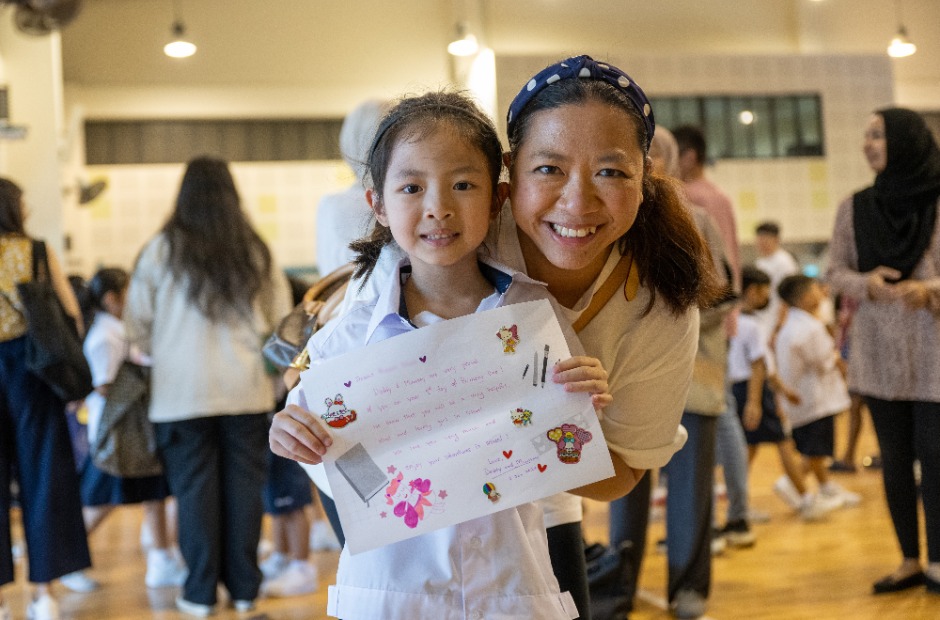Laying the Foundation for Primary Education
21 Jun 2012

Principal of Teck Ghee Primary School, Mdm Chua Pei Pei, briefed parents on the primary education system as well as the Pri 1 registration process.
The world of primary school can be intimidating not just for children, but sometimes even for parents as well. Take mother of two Ms Sufyan, for instance, whose oldest son Khaiziq is in K1. “My husband and I felt there was a lot of information to digest, so we wanted to start early in terms of familiarising ourselves with the Primary 1 registration and preparation process,” she said.
Ms Sufyan and over 600 parents were at MOE’s seminar for parents on transitioning to Primary One, which was held at Teck Ghee Primary School on 26 May 2012. The principal of the school, Mdm Chua Pei Pei, was encouraged by this turnout. As she highlighted in her presentation, “Parents play a critical role in nurturing a child’s confidence and interest in learning.”
A supportive environment
Mdm Chua provided an overview on the primary education system and noted that Singapore has one of the top education systems in the world. She also reassured parents that every primary school in Singapore is good, and highlighted some measures by MOE to ensure that all students have a holistic education.

Parents Darren Tan and Tan Sean Weay are looking for a primary school with a good performing arts programme for their daughter, Charlotte, who loves to dance.
For example, the Programme for Active Learning (PAL) exposes Pri 1 and 2 pupils to a broad range of modular activities in the areas of sports and outdoor education, as well as performing and visual arts activities. This experiential learning beyond the classroom allows the child to discover new interests and talents, and helps to build character and social skills at the same time. Subsequently, from Pri 3 onwards, pupils can specialise in their preferred extracurricular activity. PAL will be progressively rolled out to all primary schools by 2017.
For Mrs Tan Sean Weay, whose daughter Charlotte is in K1, a school’s range of PAL programmes will be an important consideration when she selects a primary school. “I feel that in terms of curriculum, it won’t really be that different across schools. My daughter loves to dance at home, so it’d be good if she could be in a school with a strong performing arts programme,” she explained.
Mdm Chua also highlighted the Learning Support Programmes (LSP) in English and Mathematics for children who may find the academic pace challenging. “The class size is small for LSP and the teachers are specially trained to deliver lessons using a variety of learning approaches to reach out to every child,” she elaborated. In addition, for children with mild learning disabilities, Mdm Chua mentioned that all primary schools are staffed with at least one Allied Educator (Learning and Behavioural Support). “We want to make sure that your child achieves his or her fullest potential during this formative period,” she said.

Parents Indra and Sufyan attended this seminar even though their son, Khaiziq, is only five years old because they wanted to be clear about the Pri 1 registration process.
Don’t worry too much
The next speaker at the seminar was Mrs Mindy Gwee, a parent volunteer at Townsville Primary School. She shared many tips on helping a child adjust to primary school life, such as helping him or her to understand the concept of flag-raising and recess, packing the child’s schoolbag and passing messages between parents and teachers. “It may seem like a lot of new things to digest all at one go,” she said, “but don’t worry, your children will eventually learn with the help of a personal buddy.” This refers to an older pupil assigned to take care of a new Pri 1 pupil during the first week of school.
During the question & answer session with the principals of nine primary schools located in Ang Mo Kio and Bishan, a father said that he was more concerned about the academic prerequisites needed to be able to keep up with the pace of the Pri 1 curriculum. The principals responded that there was no need for too much preparation in this aspect. “Just as long as the child knows simple writing, reading and arithmetic – e.g. numbers from 1 to 20 – that should be sufficient,” they assured the parents.
Parents also had questioned about the mechanics of the Pri 1 registration process. One mother asked if there was a difference between online and on-site registration – in particular, whether the choice of registration method would affect the likelihood of getting a place in primary school. The principals reassured her that there was no difference, and that places are allotted according to the registration phases and balloting system.

Parents found out out more about various primary schools in Ang Mo Kio and Bishan at the schools’ exhibition booths after the seminar.
Another parent queried what would happen if his child was not able to be placed in any school after the three phases of Pri 1 registration. He was told that MOE would place the child in the school that is nearest to his or her home. Mdm Chua added that the latest change to Pri 1 registration this year is that when balloting is necessary in a specific phase, Singapore Citizens will be given absolute priority over Singapore Permanent Residents, even before home-school distance is considered.
Above all, the principals emphasised the important role that parents play in education. Beyond just registering and preparing their children for primary school, parents are also active partners in the years of formal education that lie ahead. As Mdm Chua said in her opening remarks, “This is the beginning of the partnership between parents and schools to provide a positive learning experience for our children.”
For more information, view the following MOE video or infographic on choosing a primary school, or visit MOE’s primary school education website.


.jpg)
.jpg)

.jpg)